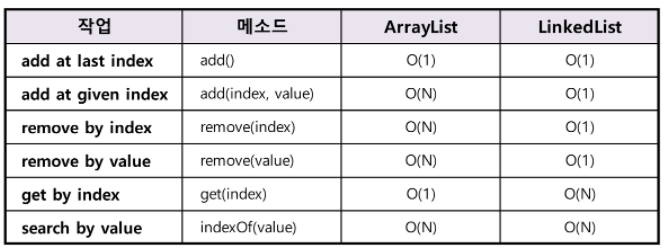Arraylist
특징
- Object[] 배열(객체 배열) 사용
- 동적 할당
- 빈공간 x -> 연속된 데이터 구조
ArrayList 구현
package algorithmStudyStringAndArray;
import Interface_form.List;
import java.util.Arrays;
public class ArrayList<E> implements List<E> {
private static final int DEFAULT_CAPACITY = 10;
private static final Object[] EMPTY_ARRAY = {};
private int size;
Object[] array;
public ArrayList(){
this.array = EMPTY_ARRAY;
this.size = 0;
}
public ArrayList(int capacity){
this.array = new Object[capacity];
this.size = 0;
}
private void resize() {
int array_capacity = array.length;
if (Arrays.equals(array, EMPTY_ARRAY)) {
array = new Object[DEFAULT_CAPACITY];
return;
}
if (size == array_capacity) {
int new_capacity = array_capacity * 2;
array = Arrays.copyOf(array, new_capacity);
return;
}
if (size < (array_capacity / 2)) {
int new_capacity = array_capacity / 2;
array = Arrays.copyOf(array, Math.max(new_capacity, DEFAULT_CAPACITY));
return;
}
}
@Override
public boolean add(E value){
addLast(value);
return true;
}
public void addLast(E value){
if(size == array.length){
resize();
}
array[size] = value;
size++;
}
@Override
public void add(int index, E value){
if(index>size ||index<0){
throw new IndexOutOfBoundsException();
}
if(index==size){
addLast(value);
}
else{
if(size == array.length){
resize();
}
for(int i =size;i>index;i--){
array[i] = array[i-1];
}
array[index] = value;
size++;
}
}
public void addFirst(E value){
add(0,value);
}
@SuppressWarnings("unchecked")
@Override
public E get(int index){
if(index>=size|| index<0){
throw new IndexOutOfBoundsException();
}
return (E) array[index];
}
@Override
public void set(int index, E value){
if(index>=size ||index<0){
throw new IndexOutOfBoundsException();
}
else{
array[index]=value;
}
}
@Override
public int indexOf(Object value){
int i =0;
for(i = 0; i<size;i++){
if(array[i].equals(value)){
return i;
}
}
return -1;
}
public int lastIndexOf(Object value) {
for(int i = size - 1; i >= 0; i--) {
if(array[i].equals(value)) {
return i;
}
}
return -1;
}
@Override
public boolean contains(Object value){
if(indexOf(value)>=0){
return true;
}
else{
return false;
}
}
@SuppressWarnings("unchecked")
@Override
public E remove(int index){
if(index>=size|| index<0){
throw new IndexOutOfBoundsException();
}
E element = (E) array[index];
array[index] = null;
for(int i=index;i<size;i++){
array[i] =array[i+1];
array[i+1]=null;
}
size--;
resize();
return element;
}
@Override
public boolean remove(Object value){
int index = indexOf(value);
if(index ==-1){
return false;
}
remove(index);
return true;
}
@Override
public int size(){
return size;
}
@Override
public boolean isEmpty(){
return size ==0;
}
@Override
public void clear(){
for(int i=0;i<size;i++){
array[i] = null;
}
size = 0;
resize();
}
}
시간복잡도

참고 문헌
ArrayList 구현 참고문헌

